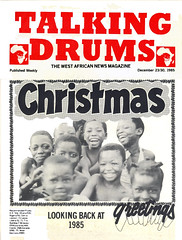What The Papers Say
People's Daily Graphic, Ghana, December 4, 1985
Aid
Whilst reports indicate that the United States administration is considering whether or not to cut its aid to Ghana, it is high time for Ghanaians to think carefully and critically about the whole question of aid.When the Secretary for Finance and Economic Planning recently returned from the Paris Conference, many of the reports and interviews referred constantly to "donor countries".
As far as the GRAPHIC is aware, a donor is someone who makes a donation, i.e. a grant or a gift. Whilst some countries have given some outright grants in the form of funds, or materials and equipment, we should call a loan a loan, even where it is given on favourable terms. Loans have to be paid back, and are certainly NOT donations.
And we should be aware, too, that many such loans involve the importation of equipment, vehicles, machinery and other items from the so-called "donor country" thus benefitting that country's industries.
What is more, the package often involves experts from the same country, whose huge salaries, transport and other expenses eat into the loan, even though there are often suitably qualified Ghanaians with equal or better knowledge of our needs.
We need these loans to get our economy on its feet, to rebuild our infrastructure, to rehabilitate our export sector. In other words, to give us the tools and the conditions to WORK for our own living.
And we appreciate the confidence which the countries concerned have demonstrated in our ability to put these loans to fruitful and responsible use. Many of these countries, such as Canada, have shown a great deal of understanding of our priorities and our objectives.
But we should STOP talking about "donors" when the word is not applicable. When you go to the bank for a loan, you don't say that the bank manager has given you a donation! Some bank managers may be more helpful and understanding than others, but that doesn't make them donors.
But when the giving or withholding of loans, or aid in any other form, is used as a political weapon, then it becomes quite a different matter.
The U.S. Government withheld aid from Ghana during the early period of the Revolution. As time went on, and the PNDC earned the respect of more and more countries and institutions as the hardships of drought and fire, and the return of a million Ghanaians from Nigeria were effectively and efficiently dealt with, and Ghanaians showed responsibility and determination in restoring dignity to our nation, U.S. had little option but to resume aid, if only to save face and avoid being the "odd man out".
At present, U.S. aid constitutes only a small fraction of the total which Ghana is receiving. If that country thinks that we are so dependent that we are prepared to lose our dignity, then she is wrong.
We do not regard aid as goodies handed out with a pat on the head for good boys and girls who toe someone else's line, only to be snatched away if we are disobedient.
Aid should be assistance from those we respect and who respect us, to enable us to free ourselves from dependence on further aid. When aid becomes a tool for manipulation, then dependence upon it is a disease as dangerous as AIDS.
National Concord, Nigeria, December 14, 1985
UNESCO at 39
As the United Nations Educational, Scientific and Cultural Organisation (UNESCO) celebrates its 39th birthday today it is also weathering the severest storm that has yet hit the organisation.With the withdrawal of the United States and Britain from the follow suit (possibly as a result of pressure from the US) many organisation, and with threats from Japan and Singapore to would have thought that the organisation would be in disarray. Much to the disappointment of the US and its collaborators, however, UNESCO is still very much alive. Thus, as we say happy birthday to UNESCO, we congratulate the organisation for its remarkable resilience in the face of this sustained onslaught.
UNESCO was established on December 14, 1946, to "con- tribute to world peace and security, by promoting collaboration among nations through education, science and culture."" While the organisation has had its fair share of disappointments over the years, overall it has recorded some notable successes.
On the educational front in particular, UNESCO can be credited for helping to reduce the high level of illiteracy in the world. In 1966, UNESCO initiated a worldwide education pro- gramme to open schools in different countries. Today, the pro- gramme can boast of 1,800 schools in 92 countries. From 1970 to 1980, world illiteracy dropped from 32.9 per cent to 28.6 per cent, much to the credit of UNESCO.
In Nigeria, UNESCO has been instrumental in improving the standard of education. From 1977 to date, the organisation has executed projects worth N10 million in various parts of the country. Over N2 million was recently earmarked for four more educational projects in Nigeria by the organisation. The organisation has executed similar programmes in many other Third World countries.
However, with 814 million adult illiterates in the world today, and with over 200 million of them in the Third World, there is no doubt that much work remains to be done, This is why we call on the rest of the world to come to the aid of UNESCO. Already the N5.5 million voluntary donation by some member countries after the US pull-out, is a strong indication of the resolve by members not to allow the organisation to go under.
We call on UNESCO not to relent in its efforts towards promoting equity in international relations. We also call on the organisation, not to succumb to the pressures from the US, Britain or their minions.
...
